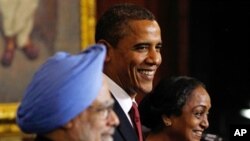"The United States not only welcomes India as a rising global power, we fervently support it, and we have worked to help make it a reality," said U.S. President Barack Obama to a joint session of the Indian Parliament last November.
"We are two free market economies where people have the freedom to pursue ideas and innovation that can change the world. And that's why I believe that India and America are indispensable partners in meeting the challenges of our time."
In the wake of the President's visit, the challenge for both countries is to find a way to "define an agenda for both governments that capitalizes on what we have achieved," said Geoffrey Pyatt, Principal Deputy Assistant Secretary of State for the Bureau of South and Central Asian Affairs.
Two areas key to the advancement of U.S.-India relations are cooperation on defense, and improvement of our government-to-government economic partnership, which must be capable of keeping pace with the private sectors of both countries.
As Principal Deputy Assistant Secretary Pyatt pointed out, "U.S.-India economic cooperation has been a driver of our transformed bilateral relationship, and in many ways is the decisive factor behind India’s changing place in the international system. Bilateral trade is flourishing, with Indian investment in the United States increasing substantially."
The geopolitical fulcrum is shifting to Asia, said Principal Deputy Assistant Secretary Pyatt. "India plays an increasingly critical role in U.S. strategy. . . . Few would disagree that furthering India’s engagement with East Asia is in the United States’ strategic interest; we must work together to strengthen the bonds that tie our nations – the world’s largest and oldest democracies – with the economic and social dynamism that exists from Hyderabad to Hanoi, and from Mumbai to Macau," he said.
"In thinking about the implications of India’s economic rise and the opportunities that presents, we should see India not just as a market for our businesses, but as a strategic partner whose increasing international role complements U.S. power.
"India’s expanding global economic stakes have reinforced its readiness to share responsibility for security in Asia, safeguarding sea and air routes on which much of the global economy depends. And it’s very much in the U.S. interest for India to build on this role in the years ahead."
Impact Of U.S. - India Partnership

India and America are indispensable partners in meeting the challenges of our time.



